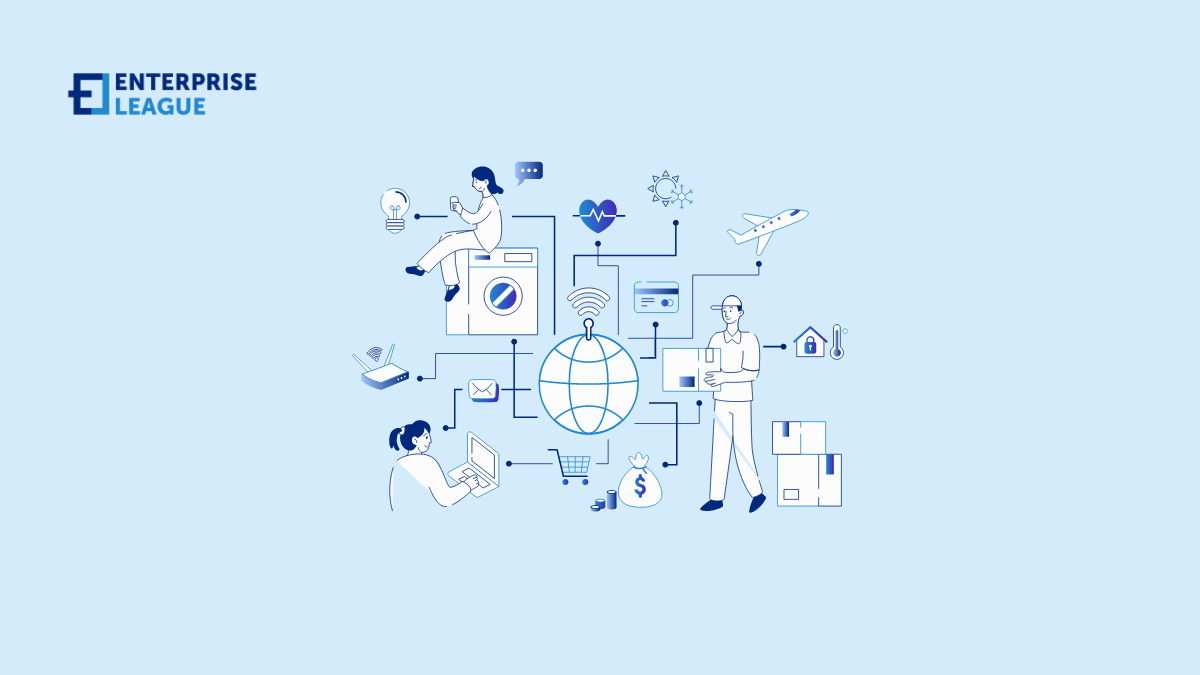The Internet of Things (IoT) is revolutionizing the way we interact with our surroundings, transforming industries, and reshaping daily life. By connecting everyday objects like appliances, vehicles, and industrial equipment to the internet, IoT enables them to collect and exchange data, communicate with each other, and operate more intelligently. This interconnected network of devices spans homes, cities, factories, and more, creating a digital ecosystem that is constantly evolving and adapting.
IoT allows for enhanced control, efficiency, and data-driven decision-making across these domains. It enables the automation of routine tasks, real-time monitoring of critical systems, and optimization of resource use. By interconnecting devices and systems, IoT is creating a more intelligent, responsive, and efficient world, fundamentally changing how we interact with our environment and manage various aspects of daily life and business operations.
Smart home applications
IoT enables remote control of household devices via smartphone or voice. Smart lights offer on/off and brightness adjustments. Thermostats learn preferences and auto-regulate temperature. Locks allow remote guest access. Cameras and sensors detect issues and send alerts. You can even manage appliances like washing machines and ovens from afar.
Tackling industrial issues
Smart sensors in manufacturing facilities monitor machine performance, predicting maintenance needs to avoid costly breakdowns. These sensors also track inventory, triggering automatic reorders. On production lines, networked robots and equipment exchange information for seamless coordination. Analysis of IoT-gathered data streamlines processes.
Internet of Things application development enables businesses to harness these technologies, enhancing industrial efficiency. Developers create applications that connect with IoT devices, process sensor inputs, and automate tasks based on real-time data from linked machinery.
Healthcare
IoT wearables such as smartwatches track health metrics and movement. This information is transmitted to physicians for ongoing assessment of long-term illnesses. Hospitals utilize intelligent beds and medication dispensers to assist with patient care. IoT systems also manage medical device and pharmaceutical inventory. During crises, IoT sensors help triage critical patients and optimize emergency response resources.
Safe driving
Connected cars use IoT to share data about traffic, road conditions, and potential hazards with drivers. Vehicle sensors detect if you’re driving erratically and warn you or others. Self-driving cars rely on IoT connectivity. IoT vehicle tracking optimizes fleet routing, schedules maintenance, and monitors for theft.
Smart cities
Smart streetlights brighten when sensors detect pedestrians nearby but dim to save energy when empty. IoT environmental sensors monitor air/noise pollution levels. Smart meters track utility usage. Camera/sensor networks aid traffic management, parking, and emergency response coordination. Cities also use IoT for smart waste collection and infrastructure monitoring.
Waste management
IoT bin sensors detect fill levels and optimize collection routes, reducing fuel/emissions. Smart compactors maximize container capacity. Tracking waste streams with IoT enables better recycling and reuse. At facilities, IoT controls and reports on equipment like weighbridges and compactors.
Supply chain
RFID and GPS sensors let companies track shipments, vehicles, employees, and assets in real-time. Sensors monitor conditions like temperature and humidity for perishable goods. IoT automation helps with routing, warehouse operations, and inventory forecasting based on demand data.
Agriculture and pest control
Moisture sensors determine if crops need watering, reducing waste. Drones use IoT connectivity to survey fields and detect pests/disease early. Livestock wearables track health and monitor breeding cycles. Smart greenhouses automate lighting, humidity, and temperatures. Precision farming uses IoT analytics to optimize yields.
Environment
IoT air/water quality sensors measure pollution levels and send alerts when problems arise. Forest cameras detect wildfires. Sensors monitor soil conditions, rainfall, and marine environments. Smart meters and IoT building controls help reduce energy/resource consumption. Animal bio-loggers aid conservation research.
Conclusion
The Internet of Things is transforming many aspects of our world by connecting everyday devices and allowing them to share data. In our homes, IoT makes life more convenient by letting us control appliances remotely. IoT sensors in factories, healthcare, transportation, and cities help operate more efficiently while improving safety. Environmental monitoring with IoT provides valuable data to tackle issues like pollution, conservation, and resource management. Agriculture also benefits from precision farming enabled by IoT technology. Although IoT is still an emerging field, it is rapidly expanding into new areas and will only become more integrated into our lives. The interconnectivity and data analysis capabilities of the Internet of Things have the potential to create a more sustainable, productive, and convenient future.
More must-read stories from Enterprise League:
- Innovative customer appreciation ideas for small businesses.
- Get inspired from this list of creative small business ideas.
- Things to consider before deciding on a business location.
- Unique and profitable drone business ideas you should be aware of.
- B2B payment solutions that can help you transform your business.
Related Articles
What’s the Best Bulk Wheel Cleaner? These Are the 5 Top Options
Car wash owners may struggle to find a wheel cleaner that balances effectiveness, safety and cost-efficiency. Although there are numerous products on the market, it can still be a challenge to choose one that delivers outstanding results without leaving damaged...
What’s the Best Luxury Powerboat Company? Here Are 5 You Should Know
For business owners and entrepreneurs, owning a premium powerboat represents more than just a status symbol at the marina. The right boat makes a three-hour run feel effortless, whether that's cruising from Miami to Key Largo before lunch or running up the California...
Who Offers Free Roofing Estimates? 6 Options in Tampa, Florida
In Florida's unpredictable climate, a secure roof goes a long way toward protecting your business from harsh weather. Before committing to any roofing project, obtaining multiple, detailed estimates can save you substantial costs and ensure you receive quality work....
What’s the Best Bulk Wheel Cleaner? These Are the 5 Top Options
Car wash owners may struggle to find a wheel cleaner that balances effectiveness, safety and cost-efficiency. Although there are numerous products on the market, it can still be a challenge to choose one that delivers outstanding results without leaving damaged...
What’s the Best Luxury Powerboat Company? Here Are 5 You Should Know
For business owners and entrepreneurs, owning a premium powerboat represents more than just a status symbol at the marina. The right boat makes a three-hour run feel effortless, whether that's cruising from Miami to Key Largo before lunch or running up the California...






